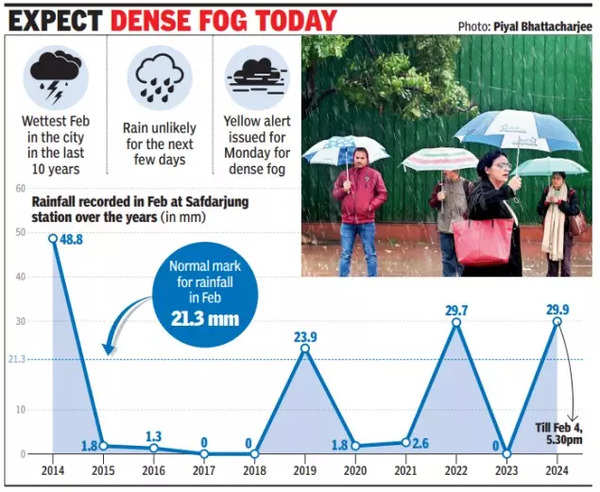As light rain fell in the city on Sunday, Safdarjung recorded 2.6mm till 8.30 am and 0.2 mm from 8.30 am to 5.30 pm.
India Meteorological Department’s data shows that the last time, Safdarjung, the city’s base station, recorded a higher rainfall than this was in February 2014 at 48.8 mm rainfall.
February 2023 did not witness a single rainy day, while in February 2022, Delhi saw 29.7 mm of rainfall.
Though the city this February has recorded excess rainfall, an analysis of the Met department’s data of the past 10 years shows that most Febs recorded deficit rainfall.
The national capital received rain on Sunday under the influence of an active western disturbance. Palam, Lodhi Road, the Ridge and Ayanagar reported 2.7mm, 1.6mm, 1.2mm and 2.2mm rainfall, respectively, till 8.30 am. Between 8.30 am and 5.30 pm, very light rain was recorded.
“Rain is unlikely from Monday onwards as the impact of the western disturbance would be over,” Kuldeep Srivastava, scientist and head of the Regional Weather Forecasting Centre, said.

The day temperature, given the rain, dropped to 20.3 degrees Celsius, two degrees below normal. It was 2.9 degrees lower than Saturday’s maximum temperature. The minimum temperature rose to 11.9 degrees Celsius, three degrees above normal. It was 5.2 degrees higher than Saturday’s minimum temperature.
The Met department has issued a ‘yellow’ alert for Monday for dense fog in the morning hours. The maximum and minimum temperatures are likely to be around 22 and 9 degrees Celsius, respectively.
“After the influence of the western disturbance is over, the minimum temperature is likely to witness a dip by 1-2 degrees due to clear skies. The night temperature is expected to hover around 7-8 degrees Celsius from February 6 onwards,” Srivastava said. Clear skies make the day warm while the heat quickly dissipates at night which causes a fall in temperature.
The maximum temperature is likely to remain around 20-22 degrees Celsius for the next six days. Strong surface winds at the speed of25-35 kmph are likely to blow on February 7 and 8.
Delhi’s air quality deteriorated to “poor” on Sunday with an AQI of 274, against 200 a day earlier.
However, the air quality is likely to improve to “moderate” on Monday but may again worsen to “poor” category on Tuesday, according to the Air Quality Early Warning System for Delhi (EWS), which is the forecasting body under the Union ministry of earth sciences.